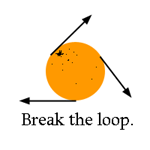

 | Tangentium |
May '05: Menu
All material on this site remains © the original authors: please see our submission guidelines for more information. If no author is shown material is © Drew Whitworth. For any reproduction beyond fair dealing, permission must be sought: e-mail drew@comp.leeds.ac.uk. ISSN number: 1746-4757 |
Volume 2, number 2: May 2005Information technology saturation and its consequencesIntroductionComputers are everywhere. One possible adjective is "ubiquitous", although as this issue shows, this term is already in use to describe a possible future. We therefore choose the term "saturation" to describe the incredible permeation of IT into every aspect of our lives. But do we really understand the impact of this saturation? Saturation of the social environment by any object or set of objects takes place at one of two levels. First, through constant, prominent display: second, through low-level, even subliminal, diffusion. In both cases we can easily become immune to the impact of the object(s). In the first case this can come about through a feeling of satiety or sheer fatigue in the face of the constant barrage. In the second, the object(s) can pass beneath our radar. Yet it is precisely around objects like these that social and political enquiry is required. A parallel is with advertising, with which our social and physical environments are equally saturated. What is the psychological and political impact of advertising? How has it affected the lives of those of us who have grown up in an advertising-saturated society? The overused but effective analogy is of the frog which does not notice the temperature of the water rising, and is thereby boiled alive. Our environment changes around us, possibly having deleterious effects, but we do not notice because our sensory apparatus is not sensitive enough to the particular change. All of these analogies are potentially applicable to the extraordinary saturation of the developed (and, increasingly, the developing) world with information technology. Academic studies have taken place around these questions; the papers in this issue of Tangentium are examples, but a far wider range of work is reviewed in the first feature essay, that of Parsons. This is a longer piece than normally appears in Tangentium but we hope that our readers forgive this indulgence. His long but extremely comprehensive work is a review of the challenges to life, research, and thought itself brought about by the emergence of truly "ubiquitous" computing - invisible or otherwise. The brief, erudite paper by Sharma focuses on the field of higher education. His first sentence reads, "A modest claim that we may advance on behalf of higher education is that the 'higher' in it points us to the ideal of cultivating disengagement from the dominant discourses of the time." But if IT represents just such a "dominant discourse", how can the saturation of HE by IT do anything to encourage such a disengagement? Sharma asks this with particular reference to India, one of the world regions with the largest growth potential; his warnings should be taken seriously. Andretta specialises in an educational field which emphasises the development of a critically informed stance vis-à-vis information, which can then be applied in other areas: this is information literacy. She describes various problems involved with getting acceptance for this kind of teaching at management level: one of which is the frequent misrepresentation of it as "IT skills". In this confusion lies a crucial element in bringing our appreciation of the role of information in our lives out from the shadows of mere IT training. This may indeed be a way in which at least one discipline of HE is, as Sharma suggested, "cultivating disengagement". But more than academic study is needed - where is public debate over policy? Over the saturation of our environment with a technology, for reasons rarely subjected to public scrutiny? We dare not risk being like the frog, ignoring the danger until it is too late - but can we live outside the vessel? The only answer is to take control... and these papers begin to ask the question of what we need to know and what we need to teach in order to give us the power to do so. NewsIt is likely that Tangentium will continue to be published on an irregular schedule, but we hope from now on to release two or three issues per year. If you would like to be notified of when a new issue is due out please e-mail the editor and you will be added to our mailing list. We still need authors and reviewers. Remember that Tangentium is now a fully peer-reviewed journal and we now have an ISSN number. Please read our submission guidelines if you are interested and note that we actively encourage contributions from students and/or anyone who does not hold a "traditional" post in academia. | |